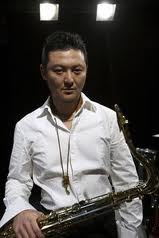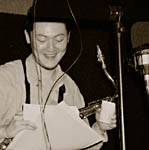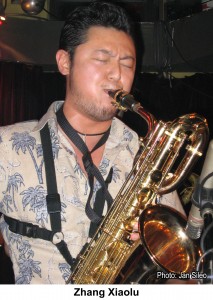This week’s blog is the second in a series of profiles of indigenous Chinese jazz musicians from my forthcoming book Jazz in the Land of the Dragon.
********************************************************
Zhang Xiaolu is a performing saxophonist who teaches jazz history, basic theory, and saxophone at the Shanghai Conservatory of Music. He uses Mark Levine books (Sher Music Co.) for the theory work. He also plays clarinet. He has 20 saxophone students and 80 students who just study introduction to jazz. Virtually all of the saxophone students are male. The jazz history class breaks down 50/50 between male and female students. The average age is 20. Some are composers, some are vocalists, and some are instrumentalists.
He heard jazz for the first time around the age of five from his grandfather, also a saxophonist. In fact, all his uncles play the saxophone. According to Xiaolu, his grandfather, who passed away in 1986, played a kind of pop music, very old Shanghai pop music, probably the kind of music heard in the dancehalls popular in Shanghai in the 1920s and 1930s.
When he was 10 years old Xiaolu’s father traveled to the United States and brought back “. . . something like Dixieland” and 33 rpm records. Although his father played the saxophone (and clarinet), he was not a professional musician. He was an acrobat/contortionist in a circus. Xiaolu studied at Boston University and took master classes in 2004 at Stanford where he worked with Dave Liebman.
I asked Xiaolu about the attraction of jazz: “Actually, I play classical and jazz. I play all kinds of music. I like all kinds of jazz, from swing to funk. It’s the freedom in the jazz music. It’s not like orchestral music where you have to play exactly as the composer wished. But with jazz, it’s your music. You can play anyway you like.”
I asked him if he thought jazz education in China would grow in the next few years: “I think so. Right now I think are some jazz courses in Shanghai and Beijing, but I know lots of cities in China where the schools are interested in offering something like jazz course, such as Hángzhōu and Nánjīng. I have some students from those kind of cities. I travel and introduce jazz to cities like Hángzhōu, Nánjīng and Quanmingm just to name a few. I think jazz is popular in China. It was popular 80 years ago, and then it stopped because of Mao. But now it continues. Like in Beijing, jazz is popular now. Some cities in the North China like Shěnyáng they are also very interested in jazz.”
 In my conversation with Xiaolu at the JZ Club in Shanghai, I also asked him about the potential growth of jazz in China:
In my conversation with Xiaolu at the JZ Club in Shanghai, I also asked him about the potential growth of jazz in China:
MARLOW: Are there any jazz clubs in those cities?
ZHANG XIAOLU: Yes, also in Congzhou and I think in Nánjīng there are one or two, not much. Also in Dàlián. They have some five star hotels that offer jazz music.
MARLOW: Is the jazz scene going to grow in Beijing and Shanghai and then into other parts of China? Is it going to grow in the next five to ten years?
ZHANG XIAOLU: Yes, I think so. There is a market here. The people like it.
MARLOW: When you say people like it are you talking about foreigners or are you talking about Chinese?
ZHANG XIAOLU: Chinese. Actually, I heard some students of mine say they go through the internet making friends. Lots of people ask what do you like, what kinds of music do you like and they will say, “Oh, I like jazz”.
MARLOW: What do you think is driving that?
ZHANG XIAOLU: There is something about jazz that is an intercultural exchange. With jazz anything can happen. You can have fusion. They can put all kinds of music together.
MARLOW: Who are the jazz players that you listen to?
ZHANG XIAOLU: Lots of them like Michael Brecker, John Coltrane, Charlie Parker, Eric Alexander, George Garzone all those people, Jerry Bergonzi.
MARLOW: What is it you like about their music?
ZHANG XIAOLU: I like the way they play, and Michael Brecker is simply the best. George Garzone is from Boston I think. He is a really good saxophone teacher and a really good player. Eric Alexander is a young saxophone player I met at Stanford.
MARLOW: We are getting a growing sense from all the people we have talked to that there are more young people getting interested in jazz, as opposed to pop music. Is that so, or is pop music still very strong here in China?
 ZHANG XIAOLU: Pop music is strong in China. It is a different kind of music, but jazz is a certain kind of music people are interested in. Right now jazz is really fashionable.
ZHANG XIAOLU: Pop music is strong in China. It is a different kind of music, but jazz is a certain kind of music people are interested in. Right now jazz is really fashionable.
MARLOW: How would you characterize the audience for jazz here in Shanghai? Is it mostly foreigners listening to the jazz or half and half Chinese and foreigners?
ZHANG XIAOLU: I think half and half.
MARLOW: What about the economics? Is jazz becoming more popular with more educated, sophisticated people here in Shanghai.
ZHANG XIAOLU: Yes, I think so.
MARLOW: Is that just the nature of the audience for jazz music overall?
ZHANG XIAOLU: Right now it is just the more educated people in China. They have more opportunity to listen to jazz. For example, in the club the drink fee is pretty expensive. If you don’t have much money, you cannot afford it. Also, it is hard to get the CDs in China. If you want to listen to jazz you better go to the clubs. But, right now you can hear jazz everywhere. For example Starbucks, and Haagen Daz ice cream shops are everywhere and they play jazz music. And lots of tea houses play jazz music. Sometimes on TV on some fashion program or something they will have jazz. But it is hard to get a jazz CD.
Next week more profiles from Jazz in the Land of the Dragon.
Please write to me at meiienterprises@aol.com if you have any comments on this or any other of my blogs.
Eugene Marlow, Ph.D.
August 20, 2012
© Eugene Marlow 2012


